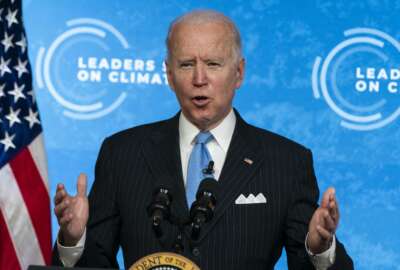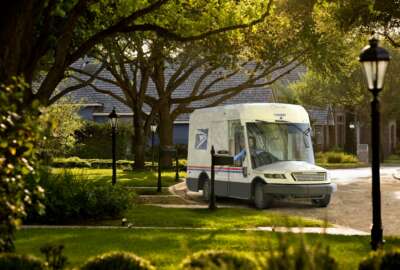Committee approves $12B for USPS, GSA to adopt electric vehicles
The House Oversight and Reform Committee on Thursday approved $12 billion for federal electric vehicles as part of the $3.5 trillion budget reconciliation packa...
Best listening experience is on Chrome, Firefox or Safari. Subscribe to Federal Drive’s daily audio interviews on Apple Podcasts or PodcastOne.
The Postal Service and the rest of the federal government are one step closer to making electric vehicles a greater presence in their fleets.
The House Oversight and Reform Committee on Thursday approved $12 billion for federal electric vehicles as part of the $3.5 trillion budget reconciliation package proposed by Democrats.
More than $7 billion would go to USPS, which owns about a third of all federal vehicles, and ranks second only to the Defense Department in terms of the largest vehicle inventory.
Another $5 billion would go to the General Services Administration to purchase over 160,000 electric vehicles and infrastructure like charging stations.
The infrastructure spending would help meet some of the goals set by President Joe Biden, who signed an executive order in his first month in office directing agencies to move the entire federal vehicle fleet to electric and zero-emission vehicles.
The funding also comes close to what USPS previously asked from Congress. Postmaster General Louis DeJoy told lawmakers in March that USPS needed $8 billion to electrify the fleet “in a shorter time frame to the maximum extent that is operationally feasible.”
USPS in its 10-year reform plan, expects to make a majority of its fleet electric within 10 years “with the right level of congressional support,” and become fully electric by 2035.
Postmaster General Louis DeJoy told the committee in February that USPS currently plans to make 10% of its next-generation vehicle fleet electric, but the agency has until early next year to finalize the percentage of electric vehicles in the next-generation fleet.
However, electric vehicles won’t currently meet all of the Postal Service’s needs. DeJoy told lawmakers there are as many as 12,500 postal routes in the country where the distance driven, environmental conditions or facility limitations would make electric vehicles “unfeasible or impractical.”
USPS awarded its next-generation delivery vehicle contract to Oshkosh Defense in February, but runner-up vendor WorkHorse filed a bid protest in June, arguing that USPS took its prototype out of consideration over a “safety incident” that was the result of a USPS test track driver’s error.
GSA funding, meanwhile, would help build momentum on acquiring more EVs. Less than 1% of the federal fleet are plug-in electric vehicles, and agencies bought only 200 electric vehicles last year.
White House National Climate Advisor Gina McCarthy, the former EPA administrator under the Obama administration, said agencies are “way behind” on charging infrastructure, with only 600 charging stations and 2,000 total chargers nationwide.
Committee Chairwoman Carolyn Maloney (D-N.Y.) said the funding would allow agencies to make substantial progress moving to an electric vehicle fleet, which she said would be less expensive to maintain.
Agencies last year spent $729 million to fuel the federal fleet, and more than $1.3 billion in maintenance and repairs, according to recent GSA data.
Ranking Member James Comer (R-Ky.) said the USPS spending in the budget reconciliation runs counter to the compromises the committee reached on the bipartisan Postal Service Reform Act.
“We should not be throwing money at the Postal Service. We should be helping it fix its broken business model – a business model that currently loses $9 billion a year, and we’ve been making progress on that front. This budget reconciliation text throws a wrench in that process,” Comer said.
USPS has more than 230,000 vehicles, and many of its Grumman Long-Life Vehicles have been in service for 30 years. National Security subcommittee chairman Stephen Lynch (D-Mass.) said these vehicles lack anti-lock brakes and airbags and get less than 10 miles per gallon. The agency last year used 85 million gallons of gasoline.
“These vehicles are on their last legs and still on the road long past their original life expectancy of 24 years,” Lynch said.
The package would also add $1 billion for the Technology Modernization Fund to support IT modernization projects, $2 billion for the Federal Citizen Services Fund to improve federal cybersecurity $350 million for IT oversight and reform initiatives at the Office of Management and Budget.
Government Operations Subcommittee Chairman Gerry Connolly (D-Va.) said the COVID-19 pandemic and several major cybersecurity incidents have underscored the need for agencies to make IT and cybersecurity investments a top priority.
“The recent enterprise-wide Solarwinds cybersecurity breach demonstrates what can go wrong for a lack of investment in upgrading our IT systems and providing for cybersecurity,” Connolly said.
The budget reconciliation package, as marked up by the committee, would also give $60 million to the National Personnel Records Center, which is run by the National Archives and Records Center in St. Louis to clear backlogs made worse by COVID-19, improve cybersecurity, and promote transparency of federal and presidential records.
The spending package also sets aside $50 million for agency inspectors general to conduct oversight of agency spending.
Copyright © 2024 Federal News Network. All rights reserved. This website is not intended for users located within the European Economic Area.
Jory Heckman is a reporter at Federal News Network covering U.S. Postal Service, IRS, big data and technology issues.
Follow @jheckmanWFED






